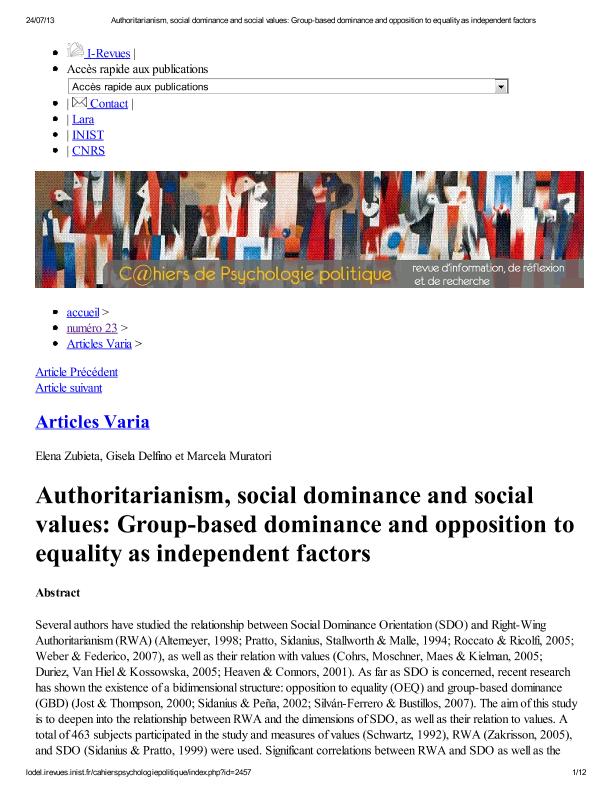Mostrar el registro sencillo del ítem
dc.contributor.author
Zubieta, Elena Mercedes

dc.contributor.author
Delfino, Gisela Isabel

dc.contributor.author
Muratori, Marcela

dc.date.available
2017-11-09T17:45:27Z
dc.date.issued
2013-07
dc.identifier.citation
Zubieta, Elena Mercedes; Delfino, Gisela Isabel; Muratori, Marcela; Authoritarianism, social dominance and social values: Group-based dominance and opposition to equality as independent factors; Association Française de Psychologie Politique; Les Cahiers de Psychologie Politique; 23; 7-2013; 1-12
dc.identifier.issn
1776-274X
dc.identifier.uri
http://hdl.handle.net/11336/27860
dc.description.abstract
Several authors have studied the relationship between Social Dominance Orientation (SDO) and Right-Wing Authoritarianism (RWA) (Altemeyer, 1998; Pratto, Sidanius, Stallworth & Malle, 1994; Roccato & Ricolfi, 2005; Weber & Federico, 2007), as well as their relation with values (Cohrs, Moschner, Maes & Kielman, 2005; Duriez, Van Hiel & Kossowska, 2005; Heaven & Connors, 2001). As far as SDO is concerned, recent research has shown the existence of a bidimensional structure: opposition to equality (OEQ) and group-based dominance (GBD) (Jost & Thompson, 2000; Sidanius & Peña, 2002; Silván-Ferrero & Bustillos, 2007). The aim of this study is to deepen into the relationship between RWA and the dimensions of SDO, as well as their relation to values. A total of 463 subjects participated in the study and measures of values (Schwartz, 1992), RWA (Zakrisson, 2005), and SDO (Sidanius & Pratto, 1999) were used. Significant correlations between RWA and SDO as well as the relationship among the SDO dimensions were found. The SEM showed that the bidimensional model had a better fit than the unidimensional one. Entering values as covariates, and RWA, SDO and its dimensions as dependent variables, several GLM analyses were performed, showing that the model was significant for RWA, SDO, BDG, and OEQ. Results also showed that RWA was better predicted by the value dimension of conservation while SDO by the dimensions of self-enhance and self-transcendence. Moreover, while the BDG and OEQ were similar in self-transcendence, BDG had a higher level of self-enhance and conservation. Finally, results relevance for theoretical and applied dimensions is discussed.
dc.format
application/pdf
dc.language.iso
eng
dc.publisher
Association Française de Psychologie Politique
dc.rights
info:eu-repo/semantics/openAccess
dc.rights.uri
https://creativecommons.org/licenses/by-nc-sa/2.5/ar/
dc.subject
Values
dc.subject
Authoritarianism
dc.subject
Social Dominance Orientation
dc.subject.classification
Psicología

dc.subject.classification
Psicología

dc.subject.classification
CIENCIAS SOCIALES

dc.title
Authoritarianism, social dominance and social values: Group-based dominance and opposition to equality as independent factors
dc.type
info:eu-repo/semantics/article
dc.type
info:ar-repo/semantics/artículo
dc.type
info:eu-repo/semantics/publishedVersion
dc.date.updated
2017-11-03T15:50:58Z
dc.journal.volume
23
dc.journal.pagination
1-12
dc.journal.pais
Francia

dc.description.fil
Fil: Zubieta, Elena Mercedes. Consejo Nacional de Investigaciones Científicas y Técnicas; Argentina. Universidad de Buenos Aires. Facultad de Psicología; Argentina
dc.description.fil
Fil: Delfino, Gisela Isabel. Consejo Nacional de Investigaciones Científicas y Técnicas; Argentina. Universidad de Buenos Aires. Facultad de Psicología; Argentina
dc.description.fil
Fil: Muratori, Marcela. Consejo Nacional de Investigaciones Científicas y Técnicas; Argentina. Universidad de Buenos Aires. Facultad de Psicología; Argentina
dc.journal.title
Les Cahiers de Psychologie Politique
dc.relation.alternativeid
info:eu-repo/semantics/altIdentifier/url/http://lodel.irevues.inist.fr/cahierspsychologiepolitique/index.php?id=2457
Archivos asociados
